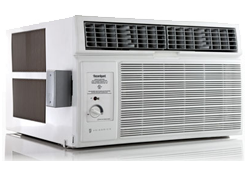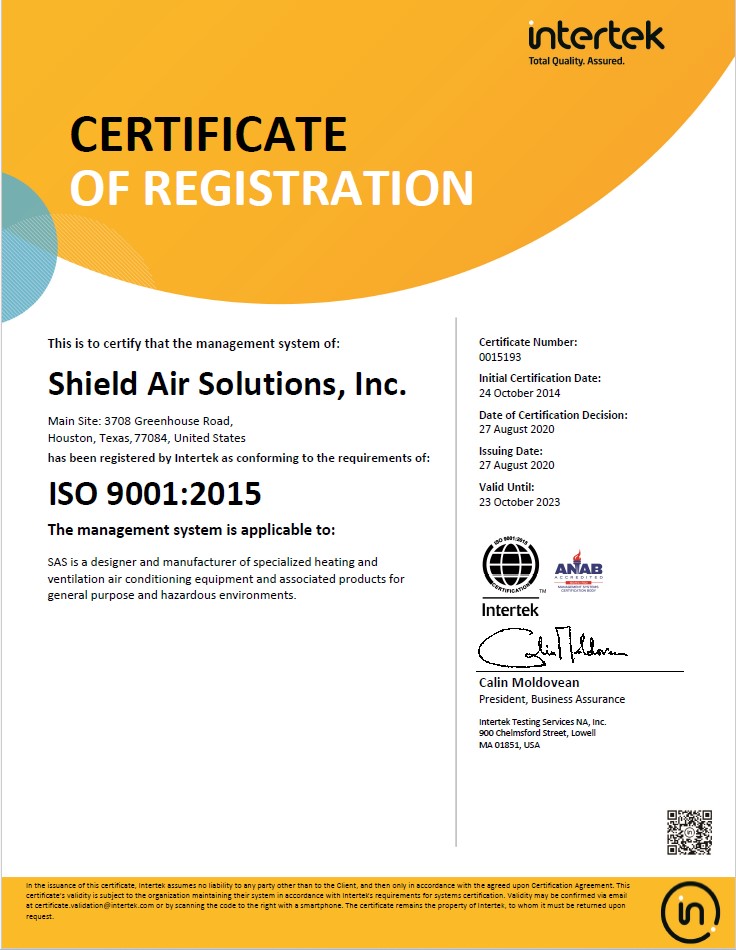Proven performance in the most challenging environments
- UL Listed for Class 1, Division 2, Groups A, B, C and D
- Certified in accordance with ISA 12.12.01 and NFPA 70 (National Electric Code), ANSI/UL 484 Room Air Conditioners
- KSA Registered and tested in accordance with SASO 2681
For more than three decades, global industry and high-tech leaders have trusted Hazardgard to provide commercial-grade cooling under the harshest conditions. You’ll find durable, reliable Hazardgard room air conditioners on oil rigs and military bases, in manufacturing companies and processing plants – anywhere hazardous materials are used. Hazardgard is specifically designed to cool spaces where volatile, flammable liquids and gases are used, within enclosed systems or containers, or under extreme temperatures..
Temperature Classification
Electrical equipment, like hazardous location air conditioners, that may be exposed to specific, hazardous gases or vapors in the area where it will be used, cannot reach temperatures that exceed 80% of the auto-ignition temperature of those gases or vapors. Hazardgard has a T4 rating, meaning its surface temperature should not exceed 135°C or 275°F. (Note: 50/60Hz model listed as T4A for surface temperatures to 120° C/248° F).
| Electrical Equipment Label | Temperature (C) | Temperature (F) |
|---|---|---|
| T1 | 450°C | 842°F |
| T2 | 300°C, | 572°F |
| T2A | 280°C | 536°F |
| T2B | 260°C | 500°F |
| T2C | 230°C | 446°F |
| T2D | 251°C | 483.8°F |
| T3 | 200°C | 392°F |
| T3A | 180°C | 356°F |
| T3B | 165°C | 329°F |
| T3C | 160°C | 320°F |
| T4 | 135°C | 275°F |
| T4A | 120°C | 248°F |
| T5 | 100°C | 212°F |
| T6 | 85°C | 185°F |
The above chart illustrates that 200°C is the maximum surface temperature for any electrical equipment with a temperature classification of T3 or higher.
Full Range of Model Specifications.
Hazardgard comes in a range of sizes and capacities.
50 Hertz – Performance
| Model | Cooling Capacity (Btu/Hr.) | Volts Rated | Cooling Watts | Energy Effi ciency Ratio (EER) | Moisture Removal Pints/ HR | Air Direction | Controls | Air Circulation (CFM) | Refrigerant |
|---|---|---|---|---|---|---|---|---|---|
| SH24N20AT | 24000/23700 | 230/208/60 | 12.6/13.5 | 2727/2788 | 8.8/8.5 | 8.20/7.5 | 8-way | 385 | R-410A |
| Model | Cooling Capacity (Btu/Hr.) | Volts Rated | Cooling Watts | Energy Effi ciency Ratio (EER) | Moisture Removal Pints/ HR | Air Direction | Controls | Air Circulation (CFM) | Refrigerant |
|---|---|---|---|---|---|---|---|---|---|
| SH24N20AT | 21000/20500 | 240/220-50 | 15.0/13.2 | 2600/2412 | 8.1/8.5 | 7.0/7.0 | 8-way | 360 | R-410A |
| SH20N50AT | 19500/19100 | 240-220-50 | 9.8/10.3 | 2167/2156 | 9.0/9.0 | 5.6/5.5 | 8-way | 425 | R-410A |
- Overview
-
Temperature Classification
Electrical equipment, like hazardous location air conditioners, that may be exposed to specific, hazardous gases or vapors in the area where it will be used, cannot reach temperatures that exceed 80% of the auto-ignition temperature of those gases or vapors. Hazardgard has a T4 rating, meaning its surface temperature should not exceed 135°C or 275°F. (Note: 50/60Hz model listed as T4A for surface temperatures to 120° C/248° F).
Electrical Equipment Label Temperature (C) Temperature (F) T1 450°C 842°F T2 300°C, 572°F T2A 280°C 536°F T2B 260°C 500°F T2C 230°C 446°F T2D 251°C 483.8°F T3 200°C 392°F T3A 180°C 356°F T3B 165°C 329°F T3C 160°C 320°F T4 135°C 275°F T4A 120°C 248°F T5 100°C 212°F T6 85°C 185°F The above chart illustrates that 200°C is the maximum surface temperature for any electrical equipment with a temperature classification of T3 or higher.
- Specifications
-
Full Range of Model Specifications.
Hazardgard comes in a range of sizes and capacities.
50 Hertz – Performance
Model Cooling Capacity (Btu/Hr.) Volts Rated Cooling Watts Energy Effi ciency Ratio (EER) Moisture Removal Pints/ HR Air Direction Controls Air Circulation (CFM) Refrigerant SH24N20AT 24000/23700 230/208/60 12.6/13.5 2727/2788 8.8/8.5 8.20/7.5 8-way 385 R-410A
Model Cooling Capacity (Btu/Hr.) Volts Rated Cooling Watts Energy Effi ciency Ratio (EER) Moisture Removal Pints/ HR Air Direction Controls Air Circulation (CFM) Refrigerant SH24N20AT 21000/20500 240/220-50 15.0/13.2 2600/2412 8.1/8.5 7.0/7.0 8-way 360 R-410A SH20N50AT 19500/19100 240-220-50 9.8/10.3 2167/2156 9.0/9.0 5.6/5.5 8-way 425 R-410A
Explosion proof air conditioner | Explosion proof fans | ATEX HVAC
ATEX Window Unit | ETL | ATEX | Marine HVAC Systems | Offshore HVAC



